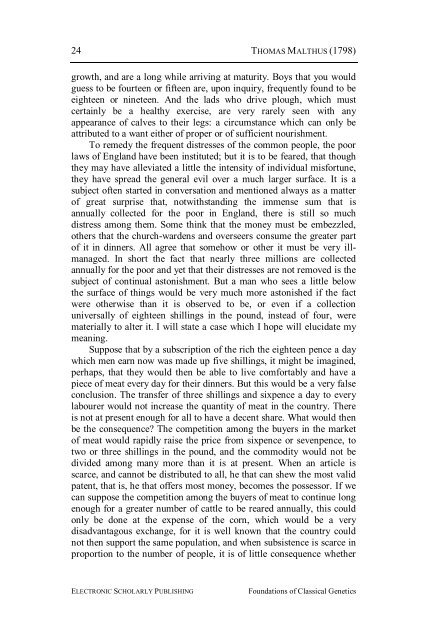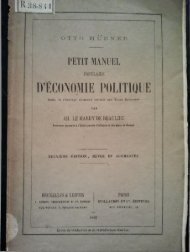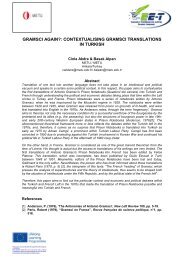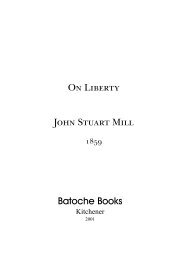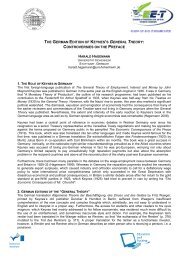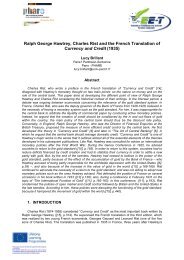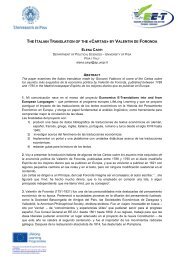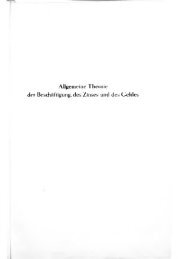Malthus, Thomas, Robert, An Essay on the Principle of Population ...
Malthus, Thomas, Robert, An Essay on the Principle of Population ...
Malthus, Thomas, Robert, An Essay on the Principle of Population ...
You also want an ePaper? Increase the reach of your titles
YUMPU automatically turns print PDFs into web optimized ePapers that Google loves.
24 THOMAS MALTHUS (1798)<br />
growth, and are a l<strong>on</strong>g while arriving at maturity. Boys that you would<br />
guess to be fourteen or fifteen are, up<strong>on</strong> inquiry, frequently found to be<br />
eighteen or nineteen. <str<strong>on</strong>g>An</str<strong>on</strong>g>d <strong>the</strong> lads who drive plough, which must<br />
certainly be a healthy exercise, are very rarely seen with any<br />
appearance <strong>of</strong> calves to <strong>the</strong>ir legs: a circumstance which can <strong>on</strong>ly be<br />
attributed to a want ei<strong>the</strong>r <strong>of</strong> proper or <strong>of</strong> sufficient nourishment.<br />
To remedy <strong>the</strong> frequent distresses <strong>of</strong> <strong>the</strong> comm<strong>on</strong> people, <strong>the</strong> poor<br />
laws <strong>of</strong> England have been instituted; but it is to be feared, that though<br />
<strong>the</strong>y may have alleviated a little <strong>the</strong> intensity <strong>of</strong> individual misfortune,<br />
<strong>the</strong>y have spread <strong>the</strong> general evil over a much larger surface. It is a<br />
subject <strong>of</strong>ten started in c<strong>on</strong>versati<strong>on</strong> and menti<strong>on</strong>ed always as a matter<br />
<strong>of</strong> great surprise that, notwithstanding <strong>the</strong> immense sum that is<br />
annually collected for <strong>the</strong> poor in England, <strong>the</strong>re is still so much<br />
distress am<strong>on</strong>g <strong>the</strong>m. Some think that <strong>the</strong> m<strong>on</strong>ey must be embezzled,<br />
o<strong>the</strong>rs that <strong>the</strong> church-wardens and overseers c<strong>on</strong>sume <strong>the</strong> greater part<br />
<strong>of</strong> it in dinners. All agree that somehow or o<strong>the</strong>r it must be very illmanaged.<br />
In short <strong>the</strong> fact that nearly three milli<strong>on</strong>s are collected<br />
annually for <strong>the</strong> poor and yet that <strong>the</strong>ir distresses are not removed is <strong>the</strong><br />
subject <strong>of</strong> c<strong>on</strong>tinual ast<strong>on</strong>ishment. But a man who sees a little below<br />
<strong>the</strong> surface <strong>of</strong> things would be very much more ast<strong>on</strong>ished if <strong>the</strong> fact<br />
were o<strong>the</strong>rwise than it is observed to be, or even if a collecti<strong>on</strong><br />
universally <strong>of</strong> eighteen shillings in <strong>the</strong> pound, instead <strong>of</strong> four, were<br />
materially to alter it. I will state a case which I hope will elucidate my<br />
meaning.<br />
Suppose that by a subscripti<strong>on</strong> <strong>of</strong> <strong>the</strong> rich <strong>the</strong> eighteen pence a day<br />
which men earn now was made up five shillings, it might be imagined,<br />
perhaps, that <strong>the</strong>y would <strong>the</strong>n be able to live comfortably and have a<br />
piece <strong>of</strong> meat every day for <strong>the</strong>ir dinners. But this would be a very false<br />
c<strong>on</strong>clusi<strong>on</strong>. The transfer <strong>of</strong> three shillings and sixpence a day to every<br />
labourer would not increase <strong>the</strong> quantity <strong>of</strong> meat in <strong>the</strong> country. There<br />
is not at present enough for all to have a decent share. What would <strong>the</strong>n<br />
be <strong>the</strong> c<strong>on</strong>sequence? The competiti<strong>on</strong> am<strong>on</strong>g <strong>the</strong> buyers in <strong>the</strong> market<br />
<strong>of</strong> meat would rapidly raise <strong>the</strong> price from sixpence or sevenpence, to<br />
two or three shillings in <strong>the</strong> pound, and <strong>the</strong> commodity would not be<br />
divided am<strong>on</strong>g many more than it is at present. When an article is<br />
scarce, and cannot be distributed to all, he that can shew <strong>the</strong> most valid<br />
patent, that is, he that <strong>of</strong>fers most m<strong>on</strong>ey, becomes <strong>the</strong> possessor. If we<br />
can suppose <strong>the</strong> competiti<strong>on</strong> am<strong>on</strong>g <strong>the</strong> buyers <strong>of</strong> meat to c<strong>on</strong>tinue l<strong>on</strong>g<br />
enough for a greater number <strong>of</strong> cattle to be reared annually, this could<br />
<strong>on</strong>ly be d<strong>on</strong>e at <strong>the</strong> expense <strong>of</strong> <strong>the</strong> corn, which would be a very<br />
disadvantagous exchange, for it is well known that <strong>the</strong> country could<br />
not <strong>the</strong>n support <strong>the</strong> same populati<strong>on</strong>, and when subsistence is scarce in<br />
proporti<strong>on</strong> to <strong>the</strong> number <strong>of</strong> people, it is <strong>of</strong> little c<strong>on</strong>sequence whe<strong>the</strong>r<br />
ELECTRONIC SCHOLARLY PUBLISHING<br />
Foundati<strong>on</strong>s <strong>of</strong> Classical Genetics


